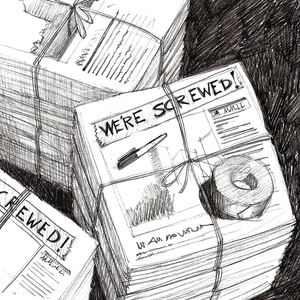Faux newspapers infringe upon respectability
It takes relatively little effort to hijack a Facebook.
A combination of convenient timing, juvenile humor and a stellar poker face is often enough to wreak virtual havoc on any unsuspecting victim, who will only come to realize all the embarrassing alterations made to their profile following a torrent of comments from confused and amused witnesses.
It takes considerably more effort to mass produce a nearly flawless hoax — a fake issue of one of the most storied publications in history.
In a move that would make Ashton Kutcher proud, a group known as the Yes Men printed and placed into circulation 100,000 fake copies of the New York Post Monday morning. Introduced by a front-page headline screaming “We’re Screwed!” in the tabloid’s ubiquitous bold print font, the central theme of the entire phony issue was rapid climate change and environmentalism. Even the famous “Page Six” gossip column and back sports sections followed suit, discussing celebrities and athletes taking part in the “green movement.”
The group is no stranger to the identity assumption business, having punk’d The New York Times, The World Trade Organization and McDonald’s in similar fashion before. But rather than following in the reckless footsteps of garden variety identity thieves, the Yes Men seek to send a legitimate message through their satirical antics, singling out what they perceive to be irresponsible corporate actions or, in some cases, inactions, to inflict a brand of vigilante justice that protects the public.
In this case, they attempt to call out a lack of progress in the effort to find a way to curb global warming, with a UN Summit meeting leading up to the UN Climate Change Conference serving as the perfect time to make an impression.
In responding to the elaborate prank, the New York Post offered a less than rousing attack against the activists, labeling it a “limp effort” and adding that the Yes Men Post had “none of the wit and insight New Yorkers expect from their favorite paper.”
The knockout punch was proclaimed that “the Post will not be hiring any of their headline writers.”
The tepid defense was no better than that of a freshly insulted fifth-grader seeking to avoid embarrassment by telling his tormentor that he was still cooler than him.
But while the New York Post seeks to put this event behind it and resigns itself to flinging acerbic comments at the activists, such a stunt should not be treated as benignly as having one’s profile picture changed to Keyboard Cat.
For starters, the sheer magnitude of the project should be room for worry — 100,000 papers is equivalent to almost one-sixth of the tabloid’s daily circulation. In comparison, the very paper in your hands reaches just 9,000, and it’s one of the largest student-run newspapers in the nation.
In their defense, the Yes Men claim that all factual information published in their version was completely true. But had there been anything over-the-top inflammatory or controversial in the issue, there would have been a huge public outcry, and the reputation of the New York Post would be subject to a barrage of bullets from the firing squad of public opinion just by name association.
And while the egg left on the face of the New York Post may have only been the size of a quail’s this time around, they still got hit.
In an industry where profits are falling faster than a certain team’s AP poll ranking numbers, it seems curious that this event hasn’t elicited a much greater response, especially out of one of the oldest papers in the country.
Where’s the pride?
If this incident has shown anything, it’s that as much as we would like to blame the declining fortunes of the print and broadcast fields on the rapid acceleration of online media and technology, a change in philosophy appears to be just as big a contributor.
As much as they hate to admit it, the New York Post is probably extremely happy right now, as the work of the Yes Men has helped to attract an onslaught of attention and buzz. Not over their own content, mind you, but over an incident in which they played no role other than unwilling a participant.
Integrity doesn’t pay the bills anymore.
As a former print journalism major who once dreamed of being able to take a stab at turning the downward trend of the medium the other way, I’m disheartened to see that the values have shifted so drastically in a profession that has endured through revolutions, depressions and wars.
The bottom line is that every ounce of respectability has to be clawed for and protected. There are more than enough sloppy news options online.
Unfortunately, right now it doesn’t appear that this is much of a fight.
Soojin Yoon is a junior majoring in public relations. His column, “Boy Meets Word,” runs Thursdays.


And regarding your comment, “there are more than enough sloppy news options online”… uh, there are plenty of sloppy news options on your television and at your newsstand, too, my friend.
Your perspective is kind of odd. The New York Post loses respectability because a bunch of pranksters pull an elaborate, illegal stunt at their expense? It doesn’t make sense. Respect is based on what you do and how you communicate, not on what other people do to you. Juvenile pranks only bring disrespect on the pranksters.